From diesel hikes to human rights: the Indigenous movement challenges Noboa’s heavy-handed rule
Editor’s Note – Update, October 15 2025:
Since the original version of this story was published, the situation in Ecuador has continued to deteriorate. Civil society organizations and community media have issued new denunciations of what they describe as state terrorism amid the ongoing national strike. While these reports have not yet been independently verified, they reflect the voices of those on the ground and the urgency of the moment.
Below the main story, we include a special update compiled by our collaborator Riki: “Ecuador in Flames: Reports of State Terrorism During the National Strike.”
In some European countries, a monarch with a symbolic role has occasionally served to restore order when the government strays from its core principles. In Ecuador, that role is played by the country’s Indigenous peoples.
Since the early 1990s, when Ecuador’s Indigenous movement organized itself nationally, its members have taken to the streets whenever certain red lines are crossed. Meanwhile, the majority of citizens watch—and approve—from their homes as governments subservient to global financial capital or grotesquely corrupt are brought down.
Para leer esta historia en Español ir a Ecuador en llamas: los pueblos originarios al rescate
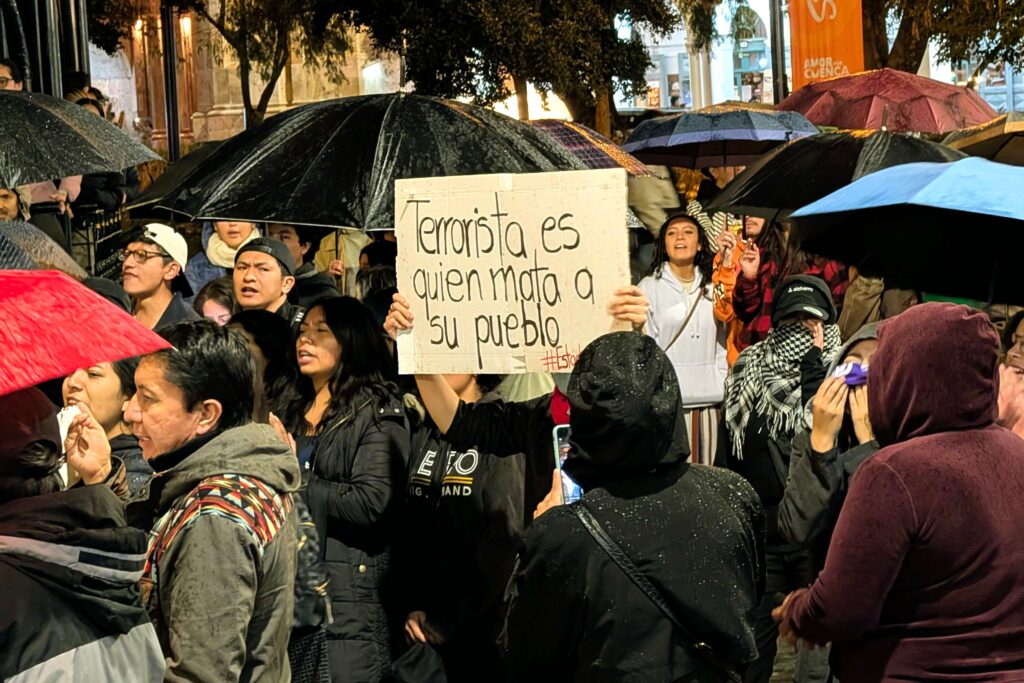
Historically, Indigenous-led strikes have commanded respect from Ecuadorian governments. The two right-wing administrations preceding Noboa’s both faced Indigenous protests and managed them with restraint. But in the current national strike, Noboa has unleashed a repressive apparatus unprecedented in Ecuador’s recent history: soldiers firing on civilians, at least one protester dead and an undetermined number injured in the strike’s first week, frozen bank accounts of Indigenous leaders and environmental activists, and terrorism charges filed against peaceful organizers with no criminal records. Dozens of protesters are jailed each day of the strike. Worse still—and acknowledged even by the government itself—detainees are being arbitrarily sent to Esmeraldas prison, currently one of the country’s most dangerous.
Amid the strike, Army Commander Gen. Iván Vásconez was removed from his post by presidential decree. Some independent outlets have suggested that his dismissal may have been linked to orders to fire on civilians, but this claim has not been corroborated by official sources or mainstream media. What is clear is that under Noboa—who prides himself on being a “ruthless enemy”—a climate of repression and persecution has taken hold, with state institutions increasingly used to silence dissenting voices.
This national mobilization is not solely about the diesel price hike—though Noboa had promised during his campaign not to raise it. When it became public that this measure was demanded by international financial institutions, it became clear that Noboa serves not Ecuadorians’ interests, but those of global finance.
His recent statements during a visit to Israel—where he claimed that “Ecuador and Israel share the same enemies”—reveal his true stance. It is a disgrace for a country that, until just a few years ago, was a beacon of peace and progressive legislation. When Noboa won his first election two years ago, many hoped he might at least restore security to the nation. Yet the situation today is worse than it was then.
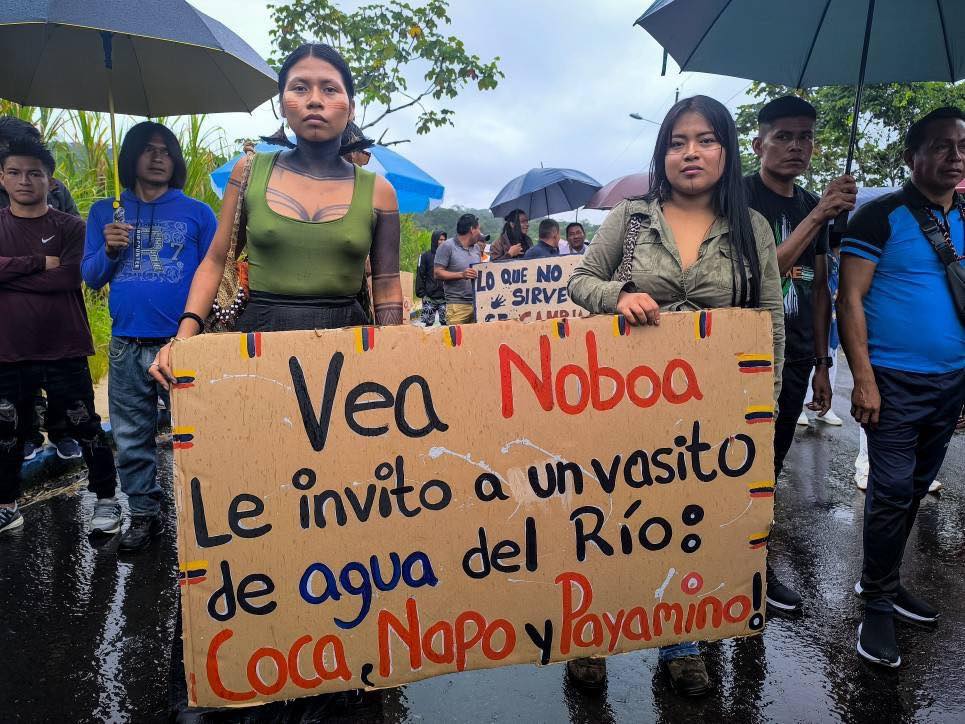
Popular Discontent with Noboa’s Government
The patience typically afforded a new leader has run out. Having seized control of every branch of power—including the media—the once-common argument that “they won’t let him govern” now rings hollow in the collective consciousness of those who once believed Noboa would be “Ecuador’s Bukele.”
Criticism now comes from the most diverse quarters. Jaime Nebot, a leader of Ecuador’s political right and former mayor who transformed Guayaquil into a modern city, accuses the government of prioritizing foreign debt payments over the country’s urgent needs.
Indigenous communities are outraged because they accuse Noboa of submitting to global banking demands and repeating policies designed to keep Latin American countries in a state of dependency. They also condemn his unconditional support for extractivism.
A national referendum was already held to ask citizens whether the state should continue oil extraction in Yasuní National Park—and the answer was a resounding “no.” Yet Noboa has pressed ahead with drilling. Another local referendum, this time in Cuenca canton, asked residents whether they approved mining in their territory, and the response was an overwhelming “no.” Nevertheless, Noboa has persisted with mining projects in El Cajas National Park.
These are two clear examples of how Noboa blatantly disregards popular will.
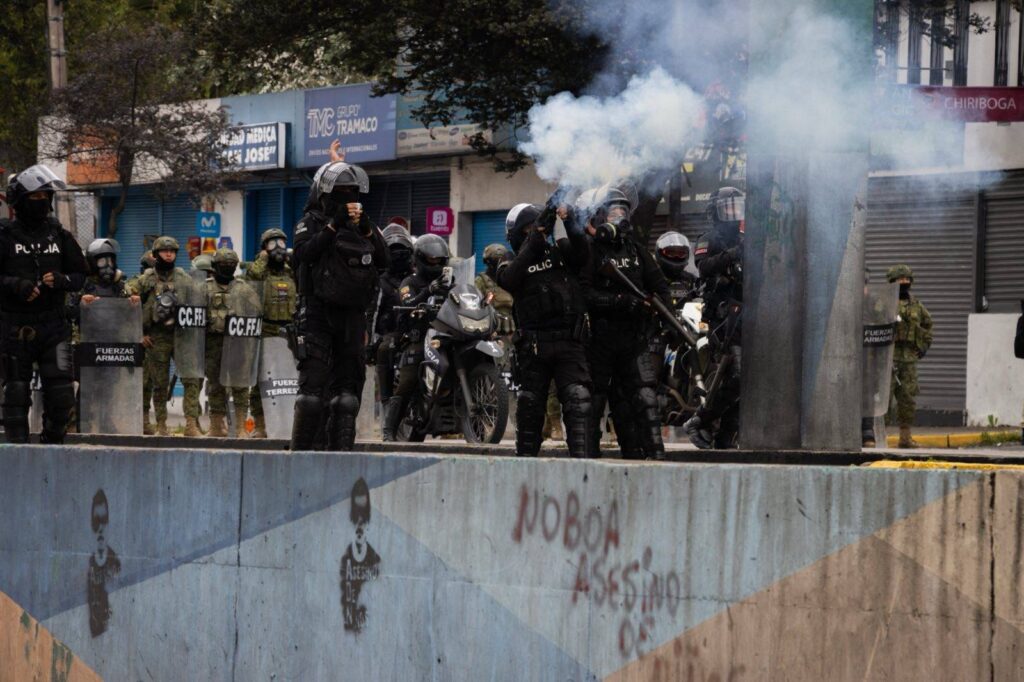
Noboa’s Constitution
Now, the government is pushing for a new Constitution, claiming that current laws make it impossible to supress crime. Yet this argument is plainly false: under Correa’s administration, Ecuador’s homicide rates dropped to levels comparable to those of Uruguay or Costa Rica… under the very same Constitution.
Correa’s public safety strategy relied on administrative coordination: he created inter-institutional task forces to align security efforts and established a Ministry of Justice tasked with monitoring every single police complaint to ensure that the police and the judges functioned properly—that is, to prevent them from being bought off by criminals.
The 2008 Constitution was deeply influenced by Indigenous worldviews: it recognized the rights of nature, enshrined food sovereignty, protected medical freedom, mandated prior consultation for extractive projects affecting rural communities, and—though controversial for allegedly overstepping into legislative territory—banned genetically modified crops in Ecuador.
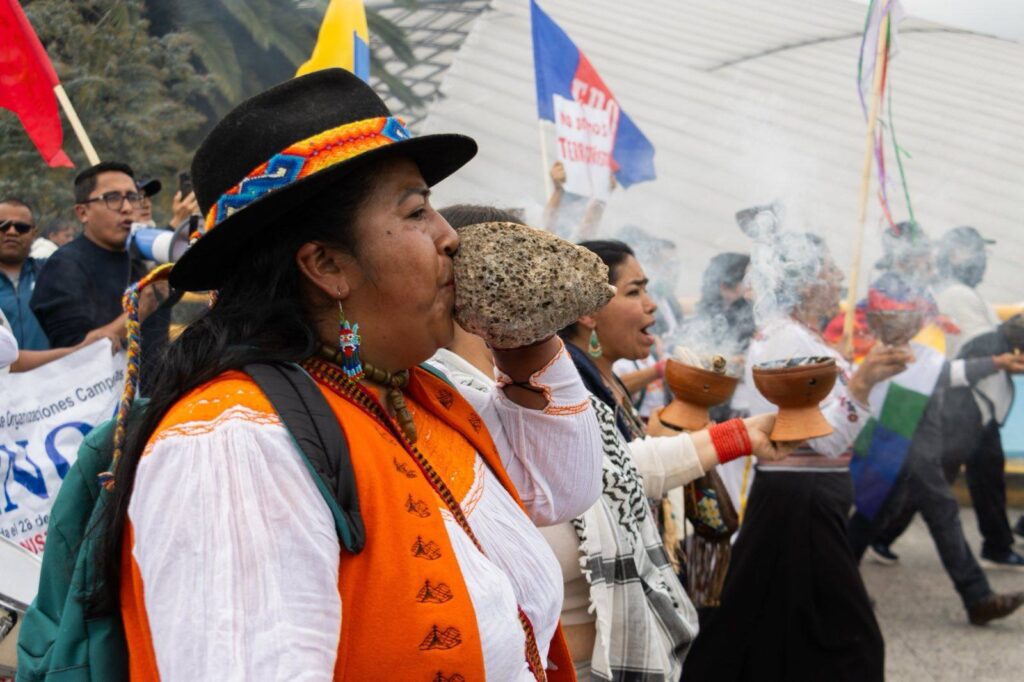
Although many call it “Correa’s Constitution,” it was never fully aligned with his government. Tensions between his policies and constitutional mandates led Correa into conflict with environmental and Indigenous movements. His administration failed to uphold key principles like food sovereignty and the rights of nature. While his government also persecuted social leaders, such actions pale in comparison to Noboa’s abuses of power and institutional breakdowns. Not even South America’s worst dictators invaded embassies, as when Noboa invaded Mexico’s embassy last year to capture a political enemy.
Yes, the current constitution could be improved, given the severe crisis of drug trafficking and insecurity gripping the country. But I deeply doubt that the political group now governing Ecuador is capable of carrying out such a task responsibly.
Across all sectors, there is a growing perception that Noboa governs to benefit his business empire and curry favor with global powers. He runs the country on autopilot through media manipulation, political persecution, and the buying of consciences.
And the saddest part is that there are still people who believe in him.
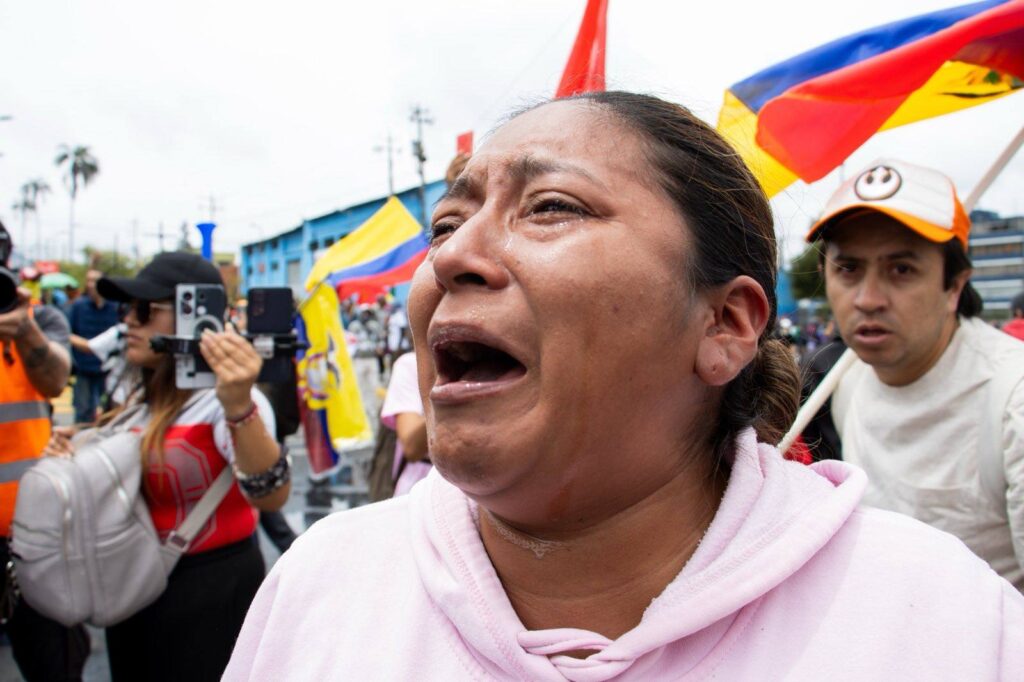
Ecuador in Flames: Reports of State Terrorism
The brutality and efficacy with which Noboa’s government confronts the national strike is probably the force that was expected to be deployed against organized crime—still operating with impunity—. In mid-October, the situation in Ecuador has escalated to levels reminiscent of a dictatorship.
October 7 — Presidential Convoy Attacked in Cañar
On October 7, 2025, President Daniel Noboa’s motorcade was attacked in the province of Cañar while passing through the canton of El Tambo. The government reported the convoy was hit with stones and even gunfire. However, the mayor of El Tambo had previously warned that the motorcade’s route through the area was an unnecessary provocation and urged it to take an alternate path to avoid tensions. This account, combined with reports that plainclothes military personnel may have been infiltrating protests to commit acts of vandalism, casts serious doubt on the official narrative.
October 8 — Open Letter from CONAPE
On October 8, 2025, the National Coordinator of Community, Alternative, and Popular Media of Ecuador (CONAPE) issued an open letter denouncing systematic harassment and attacks against its journalists covering the national strike. These communicators—often the only voice for marginalized communities—have become targets of repression, revealing a clear strategy of censorship and narrative control by the regime.
October 11 — Sanctions Against Bus Drivers
In an attempt to fracture popular support for the strike, Ecuador’s National Transit Agency (ANT) announced on October 11, 2025, severe penalties against bus drivers who transport protesters to demonstration sites. This measure aims to stigmatize social movements and sow artificial divisions among the population.
October 11 — Letter from the Federation of Neighborhoods of Quito
The Federation of Neighborhoods of Quito released a letter accusing the Noboa administration of carrying out “repression and massacre” during the strike. The organization denounced the disproportionate use of military force in working-class neighborhoods such as San Miguel del Común and Cuendina, confirming that state violence is not limited to rural areas but also targets Quito’s most vulnerable communities.
October 12, 2025 — Repression During the Quito March
During a mobilization in Quito called by CONAIE on Indigenous Resistance Day, security forces unleashed heavy repression around the Casa de la Cultura and El Arbolito Park. Protesters were dispersed with tear gas, rubber bullets, and police charges—even though the march had been proceeding peacefully after a seven-hour walk from southern Quito. Organizations like Fundamedios reported attacks on journalists, and videos circulating on social media—still under verification—showed civilians being run over. CONAIE described the state’s response as “war tactics” against a people engaged in peaceful resistance.
October 14 — Massacre in Otavalo
Events in Otavalo reached their most critical point on Tuesday, October 14, 2025—the 23rd day of the national strike. Following the Interior Minister’s declaration that “the strike ends because it ends,” security forces unleashed unprecedented violence. Indigenous and human rights organizations have denounced what they describe as a “massacre,” involving excessive use of tear gas, live ammunition, and brutal home invasions to forcibly detain young protesters.
One of the most symbolic acts of this repression was the forced cutting of hair from detained Otavaleño Indigenous people. In their culture, long hair is a sacred symbol of identity, resistance, and spiritual connection. This act is not merely abuse—it is a direct assault on their cultural identity.
October 14 — Death of a Child from Tear Gas and other atrocities in Otavalo
Perhaps the most heartbreaking allegation is that of the death of a child in his home in Otavalo on October 14, allegedly suffocated by tear gas indiscriminately fired by security forces. This is compounded by dozens of gunshot injuries—including that of journalist Edison Muenala—and reports of a complete lack of medical assistance, as hospitals are overwhelmed and reportedly denying care to protest-related casualties. There are also multiple reports of military personnel forcibly entering family homes in Otavalo to abduct young people who participated in demonstrations.
October 14 — Statement by Members of the European Parliament
The gravity of the situation has not gone unnoticed. A group of 17 Members of the European Parliament issued a public statement expressing their “deep concern” over the repression and criminalization of human rights defenders and activists in Ecuador during the national strike.
An Absent President
While the country burns, Daniel Noboa hides behind a curtain of ministers, appearing only at tightly controlled events far from the epicenter of the crisis. His rhetoric—labeling protests as “acts of terrorism”—stands in stark contrast to his refusal to engage directly with movement leaders. This attitude, combined with mounting evidence of systematic human rights violations, has led a growing number of people—even those previously neutral—to conclude that the Ecuadorian government is openly practicing state terrorism, violating its own Constitution and all international human rights agreements to which Ecuador is a signatory.
Note on Verification of These Allegations
Some reports first emerge on social media or through community media outlets. Even if not yet verified by major commercial media, they must be taken seriously—especially in a context where mainstream outlets have shown clear alignment with Noboa’s government.
Thank you for this well-written accounting Riki Cevallos. This needs to be heard.
I am appalled by what is happening. Thank you so much Riki, and Esperanza for reporting this.
Is there a way to send money to the demonstrators? I’ve done it before. I want to do it again.
Thank you for asking, Susan. Apologies for the tardy response. I will find out and report back.